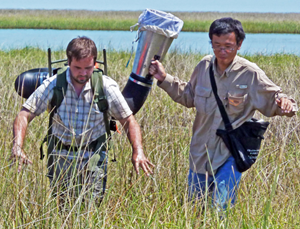
Xuan (right) and Ben Adams, AKA “Max,” (left) collect insects in Louisiana marshes using a vacuum. (Photo provided by Xuan Chen)
Can watching ants really contribute to understanding an oil spill? Yes, it can! Ants have acted as indicators of environmental change in the past.
After oil from the Deepwater Horizon spill entered his research sites, Xuan Chen began uncovering new ways that ants can act as bioindicators of oil’s presence in and impacts on Louisiana marshes.
Xuan is a Ph.D. entomology student at Louisiana State University (LSU) and a GoMRI Scholar with Coastal Waters Consortium (CWC). He shares his path into oil spill research and the exciting developments of his evolving study.
His Path
Xuan has adored bugs ever since an undergraduate course at China Agricultural University introduced him to the fascinating world of insects.
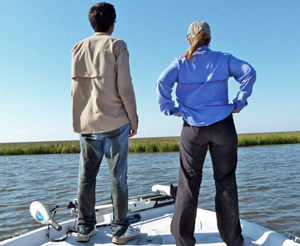
Xuan (left) and Dr. Linda Hooper-Bui (right) check up on the marshes following Tropical Storm Lee. (Photo provided by Xuan Chen)
He “fell in love” with social insects—insects that live and work cooperatively together—because of their diversity, behavior, and contributions to ecosystem health. After completing his master’s work researching bee taxonomy and pollination biology, Xuan developed an interest in ant ecology. He began searching for professors in that field and contacted Dr. Linda Hooper-Bui, an entomologist specializing in fire ants at LSU. “His application really stood out,” says Dr. Hooper-Bui. “I got a gut feeling when I talked with him, and he’s been my right-hand man from day one.”
Xuan soon started his doctoral research examining the distribution and community structure of ants in coastal ecosystems. By April 2010, he had visited 95 different marsh and dune sites from Louisiana to Florida. When the Deepwater Horizon oil spill occurred, Xuan received a call for help from Dr. Hooper-Bui—she was out of town and oil was headed for their Louisiana marsh sites. Despite a heavy end-of-semester schedule, Xuan hurried to the sites to collect more samples before the oil arrived. Using their pre-spill data, they would have the opportunity to study the oil’s effects on coastal ecosystems.
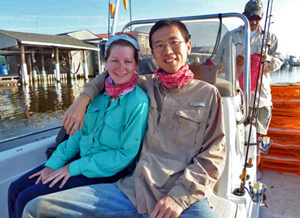
Xuan (right) and Brooke Hesson (left) en route to the marshes to collect insects and take soil samples. The boat’s captain, Jay Winters, can be seen in the background. (Photo provided by Xuan Chen)
This early research led to Xuan’s participation on two short-term GoMRI Block Grant oil spill projects led by Hooper-Bui and also his role as a member of the CWC consortium research team.
His Work
Ants’ high sensitivity to their habitats makes them excellent bioindicators of environmental change, and the spill presented “an opportunity to see if ants can indicate oil pollution in coastal ecosystems.” Xuan explains that the diversity of ants strongly corresponds with other organisms. In addition, ants are not only important food resources for many animals but also ecosystem engineers that make big contributions to nutrition cycling and microhabitat modification. Xuan’s project is special because it is one of the few studies that focuses on changes in the diversity and species composition of ants as indication of oil presence. “I also study them because they are quite pretty under the microscope,” he jokes.
However, the ants’ lovely aesthetics did not reflect the conditions of conducting marsh field research. Sinking into the mud was a frequent problem, and Xuan and his colleagues would often walk on their knees just to create enough surface area to move forward. Hooper-Bui recalls Xuan’s incredible work ethic after Hurricane Isaac, when field work became even more difficult with no water or electricity at nearby camps. “He was right there the whole time,” she says. “He didn’t care about his personal suffering. He was just happily working, knowing that we were collecting valuable data.”
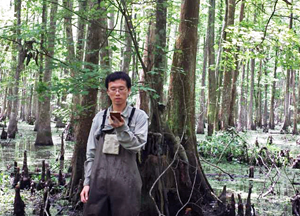
Xuan measures canopy cover in the Maurepus Swamp Wildlife Management Area using a spherical densitometer. (Photo provided by Xuan Chen)
Xuan analyzes data from control and polluted sites using the before-after-control-impact (BACI) method to determine which environmental factors affect and regulate changes in the ant community. Although his data analysis is still ongoing, he is seeing differences in the structure of ant communities in oiled sites. Even three years after oiling, his work is showing that the ants have not returned to their pre-spill conditions. Xuan explained that the underlying mechanisms of the oil’s effects can be complex. Sometimes, oil may directly or indirectly kill ants. In other cases, it alters the ants’ foraging and nesting behaviors. He hopes that future research can make more definitive conclusions about the oil’s impacts on ant communities and coastal ecosystems.
His Learning
The most significant thing Xuan has learned from CWC is the importance of collaboration. While each lab may have a specific focus, he has found that “no single lab has all the resources necessary to study oil pollution’s effects on the entire ecosystem.” Xuan’s experience has shown him that through cooperation and data sharing, seemingly unrelated fields can enhance each other’s research and start piecing together the bigger picture.
His Future
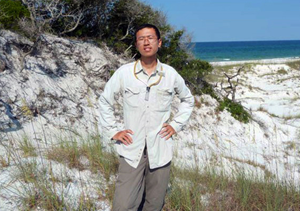
Xuan uses an aspirator to collect ants from coastal dunes in Florida’s T.H. Stone Memorial St. Joseph Peninsula State Park. (Photo provided by Xuan Chen)
Xuan loves conducting research and hopes to expand his conservation biology research into other ecosystems. Although he is still completing his Ph.D., he is interested in university-level teaching, hoping one day land his dream job: a university-level position consisting of “50% research and 50% teaching.”
Praise for Xuan
Hooper-Bui cites Xuan’s eagerness to grow as a scientist as a major contribution to his success. “I said he should write a proposal, and he’s written six to eight of them,” she says. “I explained to him that science is getting more and more collaborative, and he established collaborations all on his own with people who I don’t even know.”
Hooper-Bui also mentioned Xuan’s amazing communication skills. At the 2013 Gulf of Mexico Oil Spill and Ecosystem Conference, he was recruited by Sunshine Menendez, executive director of the Metcalf Institute for Marine and Environmental Reporting, to present a 30-minute talk for journalists on interpreting scientific data. Xuan generated his own presentation, which he used to engagingly communicate with the journalists. “He poked some fun at himself, saying ‘I’m sure you’re like here’s this Chinese guy and I’m not going to be able to understand him,’ and it immediately made them laugh and relax,” Hooper-Bui recalls. “It went better than anyone could have hoped!”
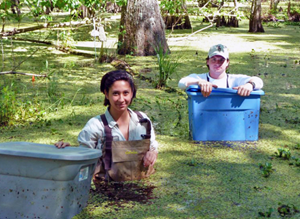
Xuan (not pictured) received a lot of helpful assistance from student workers Theresa Crupi (left) and Alexander Sabo (right). Here, they set traps in the trees at Jean Lafitte National Park and Preserve in order to collect ants. (Photo provided by Xuan Chen)
Finally, Hooper-Bui expressed ways that Xuan has influenced her own research. “He’s stretching me as a scientist,” she says. “I want him to graduate, but only because he’s just the kind of person I want as my colleague. He’s tireless, out there taking samples all day long. Had he not been there to help, there is no way I would be where I am in this research. He is the number one contributor to our oil spill data—he’s pivotal.”
The GoMRI community embraces bright and dedicated students like Xuan Chen and their important contributions. The GoMRI Scholars Programrecognizes graduate students whose work focuses on GoMRI-funded projects and builds community for the next generation of ocean science professionals.
Katie Oxford, a columnist for CultureMap – Houston, interviewed Xuan Chen and wrote a first-hand account of his marsh field work in her Tattered Jeans column: The Ant Man from the Louisiana Marsh – Meet My Chinese Hero.
Visit the CWC website to learn more about their work.
************
This research was made possible in part by a grant from BP/The Gulf of Mexico Research Initiative (GoMRI) to theCoastal Waters Consortium (CWC). The GoMRI is a 10-year independent research program established to study the effect, and the potential associated impact, of hydrocarbon releases on the environment and public health, as well as to develop improved spill mitigation, oil detection, characterization and remediation technologies. An independent and academic 20-member Research Board makes the funding and research direction decisions to ensure the intellectual quality, effectiveness and academic independence of the GoMRI research. All research data, findings and publications will be made publicly available. The program was established through a $500 million financial commitment from BP. For more information, visit http://gulfresearchinitiative.org/.
